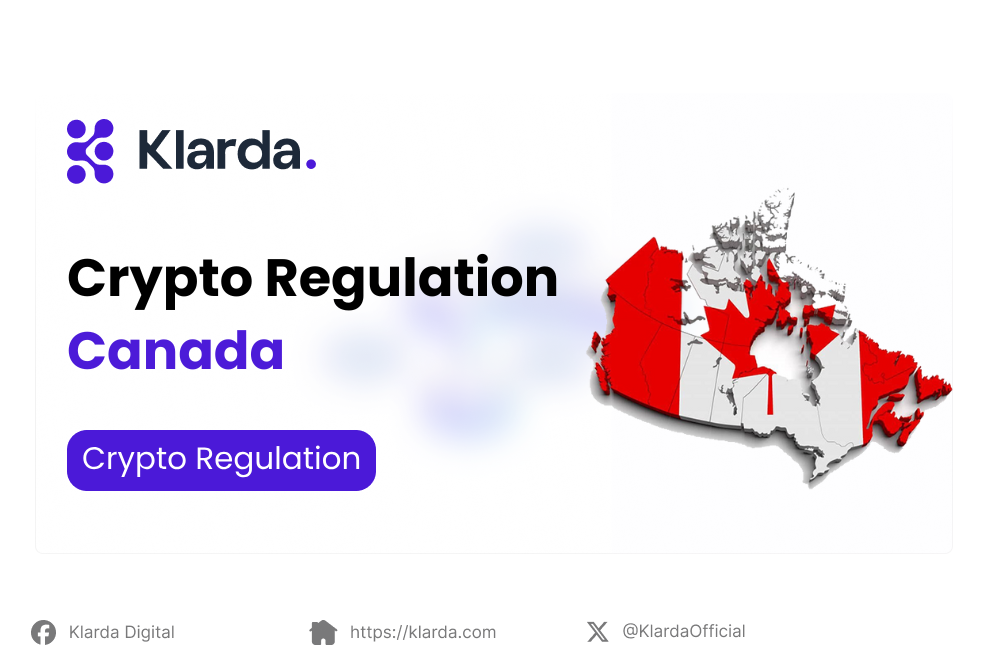Crypto Regulation in Canada
Compilation of Canada crypto regulation you should know to understand this field better. Learn now to avoid trouble and ensure the safety of your transactions.
In recent years, cryptocurrencies have become more popular in Canada. With the rapid development of technology and the widespread use of the internet, cryptocurrencies have quickly become a popular and convenient payment method. So, is cryptocurrency regulated in Canada? The Canadian government has issued some regulations on cryptocurrencies to protect consumers, prevent money laundering, and promote the development of the cryptocurrency industry. Let's explore the Canada crypto regulation to use them safely and efficiently.

KEY TAKEAWAYS
- Canada is one of the pioneers in regulating cryptocurrency.
- Canada has a robust regulatory framework for cryptocurrency.
- Cryptocurrency in Canada is considered an asset, not a currency.
LEGAL FRAMEWORK FOR CRYPTOCURRENCY IN CANADA
Is cryptocurrency considered an asset or currency in Canada?
Cryptocurrency is a type of digital asset used as a means of payment or investment. So does Canada allow crypto trading? According to Canadian regulations, cryptocurrency is not considered legal tender, but it is considered an asset. This means that cryptocurrency cannot be used as a legal payment method in Canada. However, cryptocurrency can still be used to purchase goods and services from businesses that accept cryptocurrency. This means that cryptocurrency is regulated by asset regulations, including tax regulations, anti-money laundering, and consumer protection.
Do Canadian banks allow cryptocurrency? Canadian banks are increasingly allowing cryptocurrencies. However, there are still many crypto banks that are not yet supported.
Common types of cryptocurrency in Canada
- Bitcoin (BTC): Bitcoin is the first and most popular cryptocurrency worldwide. Bitcoin is accepted as a form of payment at many stores and businesses in Canada.
- Ethereum (ETH): Ethereum is a blockchain-based smart contract platform. It allows users to create and run decentralized applications (dApps). Ethereum is also a type of cryptocurrency that can be used to purchase goods and services, invest, and trade.
- Binance Coin (BNB): Binance Coin is the native cryptocurrency of Binance, a large cryptocurrency exchange. BNB can be used to reduce transaction fees on Binance and to purchase goods and services.
- Tether (USDT): Tether is a type of stablecoin cryptocurrency pegged to the US dollar. It is used to minimize price volatility and to trade other cryptocurrencies.
- Solana (SOL): Solana is a high-speed, scalable blockchain platform. It is used to create and run dApps and to trade cryptocurrencies.
- Litecoin (LTC): Created as a similar version to Bitcoin, but with faster transaction confirmation speed and lower transaction fees. Litecoin is accepted as a form of payment at many stores and businesses in Canada.
There are also many other types of cryptocurrencies traded in Canada. Some other popular cryptocurrencies include Cardano (ADA), XRP, Dogecoin (DOGE), and Shiba Inu (SHIB).
CANADA CRYPTO REGULATION
Current regulations
Current regulations for digital currencies in Canada include:
- Registration with provincial regulatory agencies: Digital currency exchanges operating in Canada must register with the provincial regulatory agency where they operate. The provincial regulatory agency will evaluate digital currency exchanges based on specific criteria.
- Identity verification of users: Digital currency exchanges in Canada must verify the identity of users before allowing them to trade. Identity verification ensures that only qualified individuals can participate in the digital currency market.
- Protection of user assets: Digital currency exchanges in Canada must have measures in place to protect user assets from loss or theft. These protection measures include storing user assets in cold wallets and using encryption to protect user accounts.
- Transparent information about products and services: Digital currency exchanges in Canada must provide transparent information about their products and services to users. This information includes risks associated with trading, transaction fees, and terms and conditions.
- Anti-money laundering: Digital currency exchanges and businesses providing digital currency services in Canada must comply with anti-money laundering regulations. These regulations require these businesses to take measures to verify the identity of customers and report suspicious transactions.
New regulations
In February 2023, the CSA issued new guidelines to tighten regulations for cryptocurrency exchanges. These new guidelines include the following requirements:
- Segregating user funds from the exchange's operating funds.
- Suspending leverage for margin trading.
- Keeping user assets in Canada with a qualified custodian.
These new regulations aim to respond to the development of the cryptocurrency market and minimize risks for investors.
Regulations about taxes
Is crypto taxable in Canada? In Canada, cryptocurrencies are taxed as a commodity. This means that income from cryptocurrency is considered investment income and is subject to personal income tax or corporate tax. Expenses related to cryptocurrency, such as buying and selling fees, may be deducted from cryptocurrency income. Cryptocurrency investors must declare their profits to the tax authorities.
Here is a compilation of Canada crypto regulation that you should know. These new regulations are put in place to meet the development of the digital currency market and minimize risks for investors. Understanding and complying with these regulations will not only help users have a safe experience but also ensure the sustainable development of digital currency in the future. However, regulations on digital currency in Canada are still in the process of development. Authorities are still considering new regulations to align with the development of the digital currency market.
Updated 9 months ago